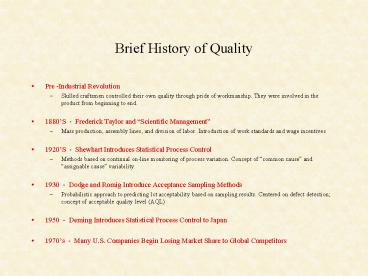Brief History of Quality - PowerPoint PPT Presentation
1 / 7
Title:
Brief History of Quality
Description:
They were involved in the product from beginning to end. ... TQM, QFD, Six Sigma, Kaizen, Poke Yoke, Taguchi Methods, Benchmarking, CQI, FMEA, ... – PowerPoint PPT presentation
Number of Views:563
Avg rating:3.0/5.0
Title: Brief History of Quality
1
Brief History of Quality
- Pre -Industrial Revolution
- Skilled craftsmen controlled their own quality
through pride of workmanship. They were involved
in the product from beginning to end. - 1880S - Frederick Taylor and Scientific
Management - Mass production, assembly lines, and division of
labor. Introduction of work standards and wage
incentives - 1920S - Shewhart Introduces Statistical
Process Control - Methods based on continual on-line monitoring of
process variation. Concept of common cause and
assignable cause variability. - 1930 - Dodge and Romig Introduce Acceptance
Sampling Methods - Probabilistic approach to predicting lot
acceptability based on sampling results. Centered
on defect detection concept of acceptable
quality level (AQL) - 1950 - Deming Introduces Statistical Process
Control to Japan - 1970s - Many U.S. Companies Begin Losing
Market Share to Global Competitors
2
- 1980 - Quality Revolution Begins in America
- NBC airs a white paper entitle If Japan Can, Why
Cant We? - Deming hired by Ford as a consultant
- 1984 - U.S. Government Designates October as
National Quality Month - 1987 - Malcolm Baldridge National Quality Award
is Established - 1990s - Quality Programs Spread to Service
Industries - Proliferation of Quality programs TQM, QFD, Six
Sigma, Kaizen, Poke Yoke, Taguchi Methods,
Benchmarking, CQI, FMEA, etc.
3
Demings 14 Points
- Create Constancy of Purpose for Improvement of
Product and Service - Adopt the New Philosophy
- Cease Dependence on Mass Inspection for Quality
Control - End the Practice of Awarding Business on Price
Tag Alone - Constantly and Forever Improve the System of
Production and Service - Institute More Thorough, Better Job-Related
Training - Institute Leadership
4
Demings 14 Points (continued)
- Drive Out Fear
- Break Down Barriers Between Departments
- Eliminate Slogans, Exhortations, and Targets of
the Work Force - Eliminate Work Standards on the Factory Floor
- Remove Barriers that Rob People of Pride of
Workmanship - Institute a Vigorous Program of Education and
Self-Improvement - Put Everybody in the Organization to Work to
Accomplish the Transformation
5
PHILLIP CROSBY ? FOUR ABSOLUTES OF QUALITY
MANAGEMENT Definition of Quality
Conformance to Requirements
System Prevention Perfor
mance Standard Zero Defects
Measurement Cost of
Quality ? CROSBYS 14 STEPS 1. Management
Commitment 2. Quality Improvement
Team 3. Quality Measurement 4. Cost of Quality
Evaluation 5. Quality Awareness 6. Corrective
Action 7. Zero Defects Planning 8. Quality
Education 9. Zero Defects Day 10. Goal
Setting 11. Error Cause Removal 12. Recognition
13. Quality Councils 14. Do It All Over Again
6
Genichi Taguchi
- Four-time winner of the Deming Award
- Joined ECL in 1949 with the charge to improve
efficiency of - R D activities. Cultivated the application of
designed experiments. - Advocates a three-stage process design
model - 1. System Design
- 2. Parameter Design
- 3. Tolerance Design
- Quality Loss Function
- Signal-to-Noise Ratio
7
Joseph Juran Author, Lecturer, Retired in
1989 Definition of Quality Fitness for Use
Activities Steering Diagnostic
Assign Priority to Projects x Pareto
Analysis of Symptoms x Theorize on
Cause of Symptoms x Test Theories Collect,
Analyze Data x Narrow List of
Theories x Design Experiment(s)
x Approve Design Provide Authority x Conduct
Experiment Establish Proof of Cause
x Propose Remedies x Test Remedies
x Take Action to Institute Remedy x
Arm
Arm
Journey from Symptom to Cause Journey from C
ause to Remedy































